- Home
- Françoise Sagan
Bonjour tristesse Page 2
Bonjour tristesse Read online
Page 2
I do not want to give the impression that he was vain about his affairs, but he made no effort to hide them from me, or to invent stories in order to justify the frequent presence at breakfast of a particular friend, not even if she became a member of our household (fortunately only temporarily!). In any case I would soon have discovered the nature of his relations with his 'guests', and probably he found it easier to be frank than to take the trouble to deceive me, and thereby lose my confidence. His only fault was that he imbued me with a cynical attitude towards love which, considering my age and inexperience, should have meant happiness and not only a transitory sensation. I was fond of repeating to myself sayings like Oscar Wilde's:
"Sin is the only note of vivid colour that persists in the modern world."
I made it my own with far more conviction, I think, than if I had put it into practice. I believed that I could base my life on it.
3
The next morning I was awakened by a slanting ray of hot sunshine that flooded my bed and put an end to my strange and rather confused dreams. Still half asleep I raised my hand to shield my face from the insistent heat, then gave it up. It was ten o'clock. I went down to the terrace in my pyjamas and found Anne glancing through the newspapers. I noticed that she was lightly, but perfectly, made up; apparently she never allowed herself a real holiday. As she paid no attention to me, I sat down on the steps with a cup of coffee and an orange to enjoy the delicious morning. I bit the orange and let its sweet juice run into my mouth, then took a gulp of scalding black coffee and went back to the orange again. The sun warmed my hair and smoothed away the marks of the sheet on my skin. I thought in five minutes I would go and bathe. Anne's voice made me jump:
"Cécile, aren't you eating anything?"
"I prefer just a drink in the morning."
"To look presentable you ought to put on six pounds; your cheeks are hollow and one can count every rib. Do go in and fetch yourself some bread and butter!"
I begged her not to force me to eat, and she was just explaining how important it was when my father appeared in his sumptuous spotted dressing-gown.
"What a charming spectacle," he said, "two little girls sunning themselves and discussing bread and butter."
"Unfortunately there's only one little girl," said Anne, laughing. "I'm your age, my dear Raymond!"
"Caustic as ever!" he said gently, and I saw Anne's eyelids flutter as if she had received an unexpected caress.
I slipped away unnoticed. On the stairs I passed Elsa. She was obviously just out of bed, with swollen eyelids, pale lips, and her skin crimson from too much sun. I almost stopped her to say that Anne was downstairs, her face trim and immaculate; that she would be careful to tan slowly and without damage. I nearly put her on her guard, but probably she would have taken it badly: she was twenty-nine, thirteen years younger than Anne, and that seemed to her a master trump.
I fetched my bathing suit and ran to the creek. To my surprise Cyril was already there, sitting on his boat. He came to meet me looking serious, and took my hands.
"I wanted to beg your pardon for yesterday," he said.
"It was my fault," I replied, wondering why he was so solemn.
"I'm very annoyed with myself," he went on, pushing the boat into the water.
"There's no reason to be," I said lightly.
"But I am!"
I was already in the boat. He was standing in the water up to his knees, resting his hands on the gunwale as if it were the bar of a tribunal. I knew his face well enough to read his expression and realised that he would not join me until he had said what was on his mind. It made me laugh to think that at twenty-five he saw himself as a seducer.
"Don't laugh," he said, "I really meant it. You have no protection against me. Look at the example of your father and that woman! I might be the most awful cad for all you know."
He was not at all ridiculous. I thought he was kind, already half in love with me, and that it would be nice to be in love with him too. I put my arms round his neck and my cheek against his. He had broad shoulders and his body felt hard against mine.
"You're very sweet, Cyril," I murmured. "You shall be a brother to me."
He folded his arms round me with an angry little exclamation, and gently pulled me out of the boat. He held me close against him, my head on his shoulder. At that moment I loved him. In the morning light he was as golden, as soft, as gentle as myself. He was protecting me. As his lips touched mine we both began to tremble, and the pleasure of our kiss was untinged by shame or regret, merely a deep searching interrupted every now and then by whispers. I broke away and swam towards the boat, which was drifting out. I dipped my face into the water to refresh it. The water was green. A feeling of reckless happiness came over me.
At half-past eleven Cyril left, and my father and his women appeared on the mule path. He walked between the two, supporting them, offering his hand to each in turn with a charm and naturalness all his own. Anne had kept on her beach wrap. She removed it with complete unconcern, while we all watched her, and lay down on the sand. She had a small waist and perfect legs, and, no doubt as the result of a lifetime of care and attention, her body was almost without a blemish. Involuntarily I glanced at my father, raising an eyebrow of approval. To my great surprise he did not respond, but closed his eyes. Poor Elsa, who was in a lamentable condition, was busy oiling herself. I did not think my father would stand her for another week. . . . Anne turned her head towards me:
"Cécile, why do you get up so early here? In Paris you stayed in bed until mid-day."
"I was working," I said. "It made my legs ache."
She did not smile. She only smiled when she felt like it, never out of politeness, like other people.
"And your exam?"
"Ploughed!" I said brightly. "Well and truly ploughed."
"But you must pass it in October."
"Why should she?" my father interrupted. "I never got any diplomas and I live a life of luxury."
"You had quite a fortune to start with," Anne reminded him.
"My daughter will always find men to look after her," said my father grandiloquently.
Elsa began to laugh, but stopped when she saw our three faces.
"She will have to work during the holidays," said Anne, shutting her eyes to put an end to the conversation.
I gave my father a despairing look, but he merely smiled sheepishly. I saw myself in front of an open page of Bergson, its black lines dancing before my eyes, while Cyril was laughing outside. The idea horrified me. I crawled over to Anne and called her in a low voice. She opened her eyes. I bent an anxious, pleading face over her, drawing in my cheeks to make myself look like an overworked intellectual.
"Anne," I said, "you're not going to do that to me, make me work in this heat . . . these holidays could do me so much good."
She stared at me for a moment, then smiled mysteriously and turned her head away.
"I shall have to make you do 'that,' even in this heat, as you say. You'll be angry with me for a day or two, as I know you, but you'll pass your exam."
"There are things one cannot be made to do," I said grimly.
Her only response was a supercilious look, and I returned to my place full of foreboding. Elsa was chattering about various festivities along the Riviera, but my father was not listening. From his place at the apex of the triangle formed by their bodies, he was gazing at Anne's upturned profile with a resolute stare that I recognised. His hand opened and closed on the sand with a gentle, regular, persistent movement. I ran down to the sea and plunged in, bemoaning the holiday we might have had. All the elements of a drama were to hand: a seducer, a demi-mondaine and a determined woman. I saw an exquisite red and blue shell on the sea-bed. I dived for it, and held it, smooth and empty, in my hand all the morning. I decided it was a lucky charm, and that I would keep it. I am surprised that I have not lost it, for I lose everything. To-day it is still pink and warm as it lies in my palm, and makes me feel like crying.
4
Anne was extraordinarily kind to Elsa during the following days. In spite of the numerous silly remarks that punctuated Elsa's conversation, she never gave vent to any of those cutting phrases which were her speciality, and which would have covered the poor girl with ridicule. I was most surprised, and began to admire Anne's forbearance and generosity without realising how subtle she was; for my father, who would soon have tired of such cruel tactics, was now filled with gratitude towards her. He used his appreciation as a pretext for drawing her, so to speak, into the family circle; by implying all the time that I was partly her responsibility, and altogether behaving towards her as if she were a second mother to me. But I noticed that his every look and gesture betrayed a secret desire for her. Whenever I caught a similar gleam in Cyril's eye, it left me undecided whether to egg him on or to run away. On that point I must have been more easily influenced than Anne, for her attitude to my father expressed such indifference and calm friendliness that I was reassured. I began to believe that I had been mistaken the first day. I did not notice that this unconcern of hers was just what provoked my father. And then there were her silences, apparently so artless and full of fine feeling, and such a contrast to Elsa's incessant chatter, that it was like light and shade. Poor Elsa! She had really no suspicions whatsoever, and although still suffering from the effects of the sun, remained her usual talkative and exuberant self.
A day came, however, when she must have intercepted a look of my father's and drawn her own conclusions from it. Before lunch I saw her whispering into his ear. For a moment he seemed rather put out, but then he nodded and smiled. After coffee Elsa walked over to the door, turned round, and striking a languorous, film-star pose, said in an affected voice:
"Are you coming, Raymond?" My father got up and followed her, muttering something about the benefits of the siesta. Anne had not moved, her cigarette was smouldering between her fingers. I felt I ought to say something:
"People say that a siesta is restful, but I think it is the opposite ..."
I stopped short, conscious that my words were equivocal.
"That's enough," said Anne dryly. There was nothing equivocal about her tone. She had of course found my remark in bad taste, but when I looked at her I saw that her face was deliberately calm and composed. It made me feel that perhaps at that moment she was passionately jealous of Elsa. While I was wondering how I could console her, a cynical idea occurred to me. Cynicism always enchanted me by producing a delicious feeling of self-assurance and of being in league with myself. I could not keep it back:
"I imagine that with Elsa's sunburn that kind of siesta can't be very exciting for either of them."
I would have done better to say nothing.
"I detest that kind of remark. At your age it's not only stupid, but deplorable."
I suddenly felt angry:
"I only said it as a joke, you know. I'm sure they are really quite happy."
She turned to me with an outraged expression, and I at once apologised. She closed her eyes and began to speak in a low, patient voice:
"Your idea of love is rather primitive. It is not a series of sensations, independent of each other. . . ."
I realised how every time I had fallen in love it had been like that: a sudden emotion, roused by a face, a gesture or a kiss, which I remembered only as incoherent moments of excitement. "It is something different," said Anne. "There are such things as lasting affection, sweetness, a sense of loss . . . but I suppose you wouldn't understand."
She made an evasive gesture and took up a newspaper. If only she had been angry instead of showing that resigned indifference to my emotional irresponsibility! All the same I felt she was right: that I was governed by my instincts like an animal, swayed this way and that by other people, that I was shallow and weak. I despised myself, and it was a horribly painful sensation, all the more since I was not used to self-criticism. I went up to my room in a daze. Lying in bed on my lukewarm sheet I thought of Anne's words: "It is something different, it's a sense of loss." Had I ever missed anyone?
The next fortnight is rather vague in my memory because I deliberately shut my eyes to any threat to our security, but the rest of the holiday stands out all the more clearly because of the rôle I chose to play in it.
To go back to those first three weeks, three happy weeks after all: when exactly did my father begin to treat Anne with a new familiarity? Was it the day he reproached her for her indifference, while pretending to laugh at it? Or the time he grimly compared her subtlety with Elsa's semi-imbecility? My peace of mind was based on the stupid idea that they had known each other for fifteen years, and that if they had been going to fall in love, they would have done so earlier. And I thought also that if it had to happen, the affair would last at the most three months, and Anne would be left with her memories and perhaps a slight feeling of humiliation. Yet all the time I knew in my heart that Anne was not a woman who could be lightly abandoned.
But Cyril was there, and I was fully occupied. In the evenings we often drove to Saint-Tropez and danced in various bars to the soft music of a clarinet. At those moments we felt we were madly in love, but by the next morning it was all forgotten. During the day we went sailing. My father sometimes came with us. He thought a lot of Cyril, especially since he had been allowed to beat him in a swimming race. He called Cyril 'my boy', Cyril called him 'sir', but I sometimes wondered which of the two was the adult.
One afternoon we went to tea with Cyril's mother, a quiet smiling old lady who spoke to us of her difficulties as a widow and mother. My father sympathised with her, looked gratefully at Anne, and paid innumerable compliments. I must say he never minded wasting his time! Anne looked on at the spectacle with an amiable smile, and afterwards said she thought her charming. I broke into imprecations against old ladies of that sort. They both seemed amused, which made me furious.
"Don't you realise how self-righteous she is?" I insisted. "That she pats herself on the back because she feels she has done her duty by leading a respectable bourgeois life?"
"But it is true," said Anne. "She has done her duty as a wife and mother, as they say."
"You don't understand at all," I said. "She brought up her child; most likely she was faithful to her husband, and so had no worries; she has led the life of millions of other women, and she's proud of it. She glorifies herself for a negative reason, and not for having accomplished anything."
"Your ideas are fashionable, but you don't know what you are talking about," Anne said.
She was probably right: I believed what I said at the time, but I must admit that I was only repeating what I had heard. Nevertheless my life and my father's upheld that theory, and Anne hurt my feelings by despising it. One can be just as attached to futilities as to anything else. I suddenly felt an urgent desire to undeceive her. I did not think the opportunity would occur so soon, nor that I would be able to seize it. Anyhow it was quite likely that in a month's time I might have entirely different opinions on any given subject. What more could have been expected of me?
5
And then one day things came to a head. In the morning my father announced that he would like to go to Cannes that evening to dance at the casino, and perhaps gamble as well. I remember how pleased Elsa was. In the familiar casino atmosphere she hoped to resume her rôle of a 'femme fatale', slightly obscured of late by her sunburn and our semi-isolation. Contrary to my expectation Anne did not oppose our plans; she even seemed quite pleased. As soon as dinner was over I went up to my room to put on an evening frock, the only one I possessed, by the way. It had been chosen by my father, and was made of an exotic material, probably too exotic for a girl of my age, but my father, either from inclination or habit, liked to give me a veneer of sophistication. I found him downstairs, sparkling in a new dinner jacket, and I put my arms round his neck: "You're the best-looking man I know!" "Except Cyril," he answered without conviction. "And as for you, you're the prettiest girl I know."
; "After Elsa and Anne," I replied without believing it myself.
"Since they're not down yet, and have the cheek to keep us waiting, come and dance with your rheumaticky old father!"
Once again I felt the thrill that always preceded our evenings out together. He really had nothing of an old father about him! While dancing I inhaled the warmth of his familiar perfume, eau de cologne and tobacco. He danced slowly with half-closed eyes, a happy, irrepressible little smile, like my own, on his lips.

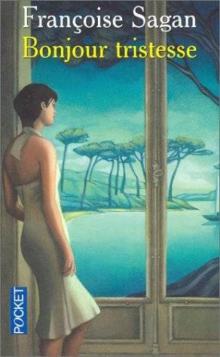 Bonjour tristesse
Bonjour tristesse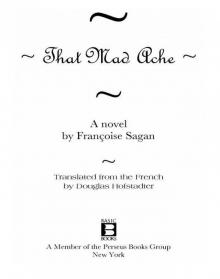 That Mad Ache & Translator
That Mad Ache & Translator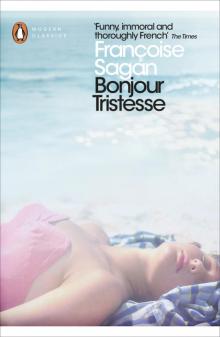 Bonjour Tristesse & a Certain Smile
Bonjour Tristesse & a Certain Smile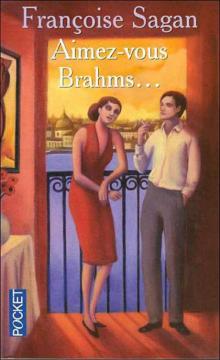 Aimez-vous Brahms?
Aimez-vous Brahms?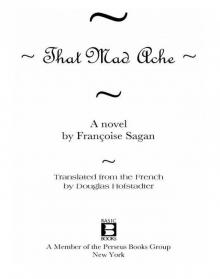 That Mad Ache
That Mad Ache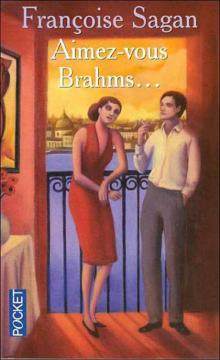 Aimez-vous Brahms
Aimez-vous Brahms